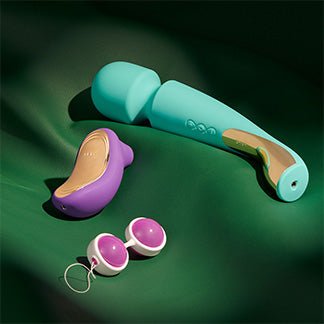
Debunking vibrator myths: answering the web's most asked questions!
Share
Vibrators have been a subject of curiosity, speculation, and misinformation for decades. With their increasing popularity and accessibility, questions and myths surrounding their usage have emerged. In this blog post, I am writing to address and clarify some common queries and misconceptions regarding vibrators.
1. Can vibrators go in checked baggage?
Yes, vibrators are permitted in checked baggage. The Transportation Security Administration (TSA) and the Canadian Air Transport Security Authority (CATSA) both allow sex toys in both carry-on and checked luggage. However, it's always a good idea to check the regulations of the specific airline and country you are traveling to, as some places may have different guidelines.
2. Can vibrators cause numbness?
This is a common myth, but good news the answer is no! When used properly, vibrators should not cause numbness. However, overuse or excessive pressure on sensitive areas can lead to TEMPORARY ( I repeat TEMPORARY) numbness. It's important to use vibrators body's signals to avoid any discomfort or potential issues. Matt Lachman, a certified sex therapist and owner of Cleveland Sex Therapy, recommends to use water based lubricant to prevent friction or discomfort while enjoying your vibrator.
3. Can vibrators delay periods?
There is no scientific evidence to suggest that vibrators can delay periods. Menstrual cycles are regulated by hormonal changes in the body, and external factors like vibrator usage do not typically influence them. Masturbation, with our without a vibrator, is actually recommended during your period since you will release endorphins during an orgasm. Endorphins are a natural painkiller. Deep vibrations can also help with muscle relaxations and contractions. Wand-type vibrators are actually great during your period.
4. Can vibrators be heard through walls?
The sound produced by vibrators varies depending on the model and intensity settings. While some vibrators may produce audible noise, especially at higher speeds, many modern designs are engineered to be discreet and quieter. Most of our vibrators are bellow 50 decibel, and Satisfyer vibrators come with a Whisper mode that is guaranteed to be quiet!
5. Can vibrators damage sperm?
There is no evidence to suggest that vibrators can damage sperm. Sperm are located within the female reproductive tract during intercourse or ejaculation, and external vibrations are unlikely to affect their viability or health. It's actually quite the opposite! Vibratory stimulation is a viable treatment option for premature ejaculation as well as delayed ejaculation according to a study published in the National Library of Medicine .
6. Can vibrators cause early miscarriage, affect implantation or hurt the fetus ?
There is no scientific evidence linking to any of these conditions. Miscarriages are typically caused by genetic abnormalities or issues with the pregnancy, rather than external factors like vibrator use. Your baby is fully protected by the amniotic sac (a thin-walled bag that holds the fetus and surrounding fluid) and the strong muscles of the uterus. There's also a thick mucus plug that seals the cervix and helps guard against infection. A penis or vibrator won't be in contact with the fetus or embryo during sex or masturbation.
However, according to an article in Healthline, it is recommended to avoid using a vibrator if you experience bleeding your pregnancy or if your water has already broken. Should you have any concerns about sexual activity during pregnancy I recommend contacting your healthcare practioner for personalized advice.
7. Can vibrators reduce belly fat?
Vibrators are not designed or proven to reduce belly fat. Weight loss and body fat reduction require a combination of healthy eating, regular exercise, and lifestyle changes.
8. Can vibrators cause abdominal pain?
If used improperly or excessively, vibrators may cause discomfort or abdominal pain. It's important to read the instruction manual of your vibrator before the first use. Start with lower intensity settings and gradually increase as desired, while also paying attention to any signs of discomfort and adjusting accordingly.
9. Can vibrators cause herpes outbreaks?
Herpes outbreaks are typically triggered by stress, illness, hormonal changes, or other factors that affect the immune system. There is no direct link between vibrator use and herpes outbreaks. However, individuals with herpes should take precautions to prevent skin-to-skin contact during sexual activity, including vibrator use, to reduce the risk of transmission.
10. Can vibrators cause pelvic pain?
When used correctly, vibrators should not cause pelvic pain. However, if a vibrator is used too aggressively or without sufficient lubrication, it may cause discomfort or irritation in the pelvic region. It's important to communicate with your partner and pay attention to your body's responses during sexual activity. And especially if it's your first time using a vibrator I recommend using a water based lube, you can find our favourite water-based lube here
12. Can vibrators transmit HIV?
HIV is primarily transmitted through unprotected sexual intercourse, sharing needles, or exposure to infected bodily fluids. Vibrators themselves do not transmit HIV. However, if a vibrator is shared between partners without proper cleaning or if it comes into contact with bodily fluids containing HIV, there is a potential risk of transmission. It's important to practice safe sex and proper hygiene when using sex toys to reduce the risk of sexually transmitted infections.
Vibrators are tools for sexual pleasure and exploration, and like any other product, they come with their own set of facts and myths. By addressing common questions and misconceptions, I hope to promote a better understanding of vibrators and encourage safe and responsible use. Remember to prioritize communication, consent, and self-awareness in all sexual experiences. And if you have any questions about our products please feel free to ask !



